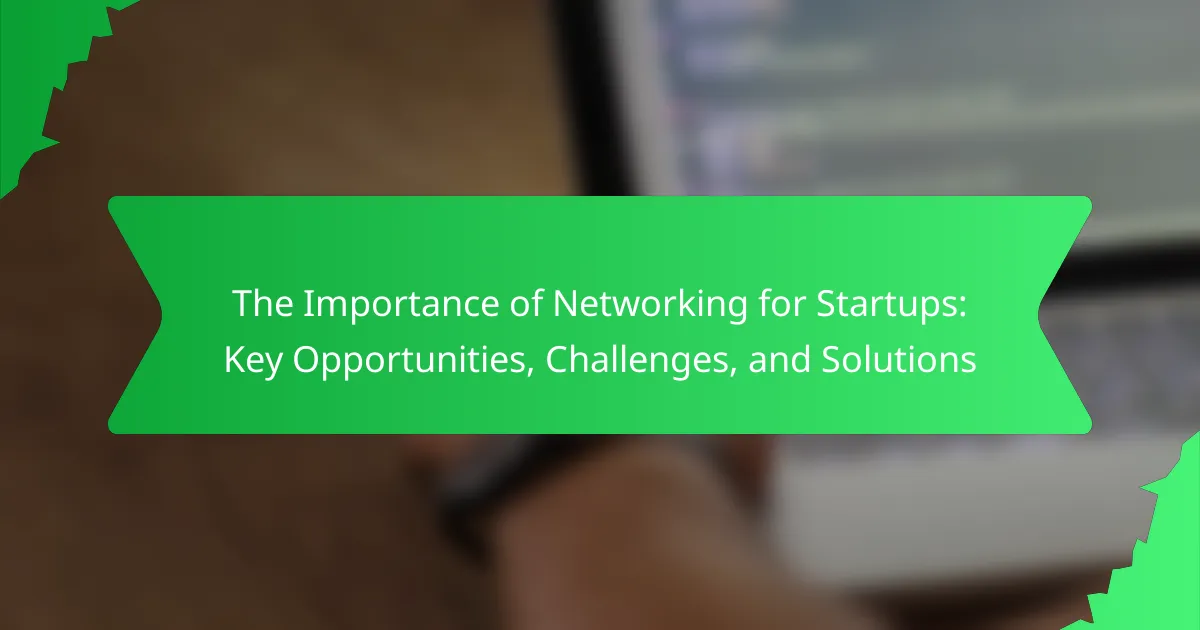Networking is essential for startups as it provides access to vital resources, knowledge, and opportunities that are often unavailable to new businesses. Startups face unique challenges in networking, including limited resources, lack of established credibility, and difficulty in identifying suitable opportunities. This article explores the significance of networking for startups, highlighting the benefits such as gaining customers, insights into industry trends, and enhancing credibility. Additionally, it addresses the barriers startups encounter and presents effective networking solutions, including online platforms, industry events, and mentorship programs, to foster growth and development.

Why is Networking Important for Startups?
Networking is crucial for startups because it facilitates access to resources, knowledge, and opportunities. Startups often lack the established connections that larger companies possess. Networking helps them build relationships with potential investors, mentors, and partners. According to research by the Kauffman Foundation, 70% of new businesses find their first customers through networking. Additionally, networking offers startups insights into industry trends and best practices. This exchange of information can lead to innovative ideas and solutions. Furthermore, a strong network can enhance a startup’s credibility in the market. Thus, effective networking is a key driver of success for startups.
What are the key benefits of networking for startups?
Networking provides startups with access to valuable resources and opportunities. It enables connections with potential investors, which can lead to funding. Networking also facilitates partnerships that can enhance product offerings. Startups gain insights from experienced entrepreneurs through networking. This exchange of knowledge can improve business strategies. Additionally, networking helps in building a support system for emotional and professional guidance. According to a report by the Kauffman Foundation, 70% of startups attribute their success to networking. These benefits collectively increase the chances of startup survival and growth.
How does networking enhance visibility for startups?
Networking enhances visibility for startups by connecting them with potential customers, investors, and partners. This connection allows startups to showcase their products and services to a broader audience. Increased exposure leads to brand recognition and credibility in the market. Networking events, such as conferences and trade shows, provide platforms for startups to present their ideas. Engaging with industry leaders can also lead to valuable endorsements. According to a study by the Kauffman Foundation, 70% of startups credit networking with helping them gain visibility. These relationships often result in referrals and collaborations that further amplify a startup’s reach.
In what ways can networking lead to funding opportunities?
Networking can lead to funding opportunities by connecting startups with potential investors. Personal relationships often increase trust and credibility. Investors are more likely to fund ventures they are familiar with. Networking events provide platforms to showcase ideas directly to investors. Referrals from mutual connections can facilitate introductions to funding sources. Engaging in industry-specific groups can identify niche investors interested in particular markets. Additionally, networking can offer insights into funding trends and investor preferences. These interactions often result in follow-up meetings and discussions about financial backing.
What role does networking play in building partnerships?
Networking is essential in building partnerships as it facilitates connections between individuals and organizations. It enables startups to meet potential partners who share similar goals and values. Through networking, startups can exchange ideas, resources, and opportunities that lead to collaborative efforts. Effective networking increases visibility and credibility within an industry. It also provides access to valuable insights and experiences from established partners. Research shows that 85% of jobs are filled through networking, highlighting its importance in creating professional relationships. Additionally, partnerships formed through networking can lead to increased funding and market reach for startups.
How can startups identify potential partners through networking?
Startups can identify potential partners through networking by actively engaging in industry events and conferences. These gatherings provide opportunities to meet like-minded professionals. Startups should also leverage online platforms like LinkedIn to connect with relevant individuals. Joining industry-specific groups can facilitate relationships with potential partners. Additionally, startups can attend workshops and seminars to expand their network. Building genuine relationships is crucial for identifying partnership opportunities. Research shows that 70% of jobs are found through networking, highlighting its importance in business development.
What strategies can startups use to foster meaningful connections?
Startups can foster meaningful connections by engaging in networking events. These events provide opportunities to meet potential partners and customers. Collaborating with other startups can also enhance relationships. Shared projects create trust and mutual benefit. Utilizing social media platforms helps startups reach a wider audience. Platforms like LinkedIn enable direct communication with industry professionals. Offering value through content, such as webinars or blogs, attracts connections. Providing insights or solutions establishes credibility and rapport. Participating in local community initiatives strengthens local ties. Building relationships within the community fosters loyalty and support.

What Challenges Do Startups Face in Networking?
Startups face several challenges in networking. Limited resources hinder their ability to attend events and build connections. Lack of established credibility makes it difficult to gain trust from potential partners. Additionally, startups often struggle with identifying the right networking opportunities that align with their goals. Time constraints can prevent founders from dedicating enough effort to networking. Furthermore, competition from other startups can create an intimidating environment. According to a survey by the Kauffman Foundation, 40% of entrepreneurs cite networking as a barrier due to these factors. These challenges collectively impede the growth and development of startups in their networking efforts.
What common obstacles hinder effective networking for startups?
Common obstacles that hinder effective networking for startups include lack of time, limited resources, and insufficient connections. Startups often operate under tight schedules, leaving little room for networking activities. Financial constraints can limit attendance at events or access to networking platforms. Additionally, many startup founders may not have established networks, making it challenging to connect with potential partners or investors. A study by the Kauffman Foundation found that 70% of entrepreneurs cite lack of connections as a significant barrier to networking. This highlights the critical need for effective strategies to overcome these obstacles.
How can startups overcome the fear of networking?
Startups can overcome the fear of networking by practicing and preparing in advance. Role-playing networking scenarios can build confidence. Attending smaller events can create a more comfortable environment. Setting specific networking goals can provide focus. Additionally, leveraging online platforms for initial connections can ease anxiety. Research shows that preparation reduces stress and increases engagement. A study by the Harvard Business Review indicated that practiced networking leads to more meaningful connections.
What are the challenges of finding the right networking events?
Finding the right networking events can be challenging due to several factors. First, the sheer volume of events can be overwhelming. Startups may struggle to identify which events align with their specific industry or goals. Additionally, many events may lack relevant attendees, limiting meaningful connections. The cost of attending certain events can also be a barrier for startups with tight budgets.
Moreover, the timing of events may not always fit within a startup’s schedule, further complicating attendance. Quality can vary significantly across events, making it difficult to gauge their value beforehand. Finally, geographical limitations can restrict access to valuable networking opportunities, especially for startups located in less populated areas.
How do time constraints impact networking efforts?
Time constraints significantly hinder networking efforts. Limited time reduces the ability to engage with potential contacts. Individuals may miss opportunities to attend events or meetings. This leads to fewer connections being made. Networking often requires follow-up communication, which time constraints can impede. As a result, relationships may not develop fully. Studies indicate that effective networking relies on consistent interaction. Therefore, time limitations can severely restrict the growth of professional networks.
What tips can startups implement to manage their networking time effectively?
Startups can manage their networking time effectively by setting clear goals for each networking event. Identify specific outcomes desired from each interaction. Prioritize events that align with business objectives. Use a calendar to schedule networking activities and allocate time slots. Limit attendance to high-value events to maximize connections. Prepare an elevator pitch to communicate the startup’s value succinctly. Follow up with contacts promptly after meetings to reinforce connections. Utilize digital tools to streamline scheduling and communication. These strategies help startups make the most of their networking efforts.
How can startups prioritize networking amidst other responsibilities?
Startups can prioritize networking by scheduling dedicated time for it each week. This approach ensures consistent engagement with potential partners and customers. Setting specific networking goals can also help focus efforts. For example, aiming to attend at least one industry event monthly fosters connections. Leveraging online platforms like LinkedIn allows for networking without significant time investment. Additionally, integrating networking into existing activities, such as meetings or conferences, can maximize efficiency. Research shows that 85% of jobs are filled through networking, highlighting its importance for startups.

What Solutions Exist for Effective Networking in Startups?
Effective networking solutions for startups include leveraging online platforms, attending industry events, and joining local business groups. Online platforms like LinkedIn enable startups to connect with potential partners and investors. Industry events provide opportunities for face-to-face interactions and relationship building. Local business groups foster community connections and collaboration. Additionally, mentorship programs can offer guidance and introduce startups to valuable contacts. Research shows that 85% of jobs are filled through networking, highlighting its importance. Networking can lead to partnerships, funding, and market insights, essential for startup growth.
What strategies can startups employ to network successfully?
Startups can employ several strategies to network successfully. First, they should attend industry events and conferences. These gatherings provide opportunities to meet potential partners and investors. Second, leveraging social media platforms is essential. Engaging with relevant content can increase visibility and attract connections. Third, startups should join local business organizations. Memberships can facilitate introductions to other entrepreneurs and resources. Fourth, building relationships with mentors is crucial. Experienced mentors can offer guidance and valuable contacts. Fifth, startups should utilize co-working spaces. These environments encourage collaboration and networking among diverse professionals. Lastly, following up with contacts is vital. Consistent communication helps maintain relationships and opens doors for future opportunities.
How can leveraging social media enhance networking opportunities?
Leveraging social media enhances networking opportunities by facilitating connections with a broader audience. Social media platforms allow individuals to engage with industry professionals and peers globally. They provide tools for sharing insights and showcasing expertise. This visibility can attract potential collaborators and clients. According to a 2021 LinkedIn survey, 85% of jobs are filled through networking. Additionally, social media enables real-time communication, fostering relationships more quickly than traditional methods. Engaging in relevant groups and discussions can lead to valuable connections. Overall, social media is a powerful tool for expanding professional networks effectively.
What role do networking events play in startup growth?
Networking events are crucial for startup growth. They provide opportunities for founders to connect with potential investors. These events facilitate partnerships that can lead to resource sharing. Networking helps startups gain visibility within their industry. Founders can receive mentorship from experienced entrepreneurs at these gatherings. Access to valuable feedback on business ideas is another benefit. Networking events often lead to collaborations that enhance product development. According to a study by the Kauffman Foundation, 70% of startups credit networking as a key factor in their success.
How can startups measure the success of their networking efforts?
Startups can measure the success of their networking efforts through specific metrics. These metrics include the number of new contacts made during events. Tracking follow-up engagements can also indicate interest and potential collaboration. Analyzing referral rates from contacts can show how effective networking is in generating leads. Measuring conversion rates of leads generated through networking is essential for understanding impact. Additionally, startups should assess the quality of relationships built, not just quantity. Surveys can provide feedback on the value of connections made. Finally, monitoring business growth indicators linked to networking efforts can validate success.
What metrics should startups consider when evaluating networking outcomes?
Startups should consider metrics such as lead generation, conversion rates, and relationship strength when evaluating networking outcomes. Lead generation measures the number of potential clients or partners gained through networking. Conversion rates assess how many of those leads turn into actual business relationships or sales. Relationship strength gauges the quality of connections, often evaluated through follow-up interactions and engagement levels. Additionally, return on investment (ROI) from networking activities is crucial. This metric quantifies the financial benefits gained relative to the costs incurred during networking efforts. Tracking these metrics provides startups with actionable insights to refine their networking strategies.
How can feedback improve future networking strategies for startups?
Feedback can enhance future networking strategies for startups by providing actionable insights. Startups can assess what networking approaches were effective through feedback. This evaluation helps in identifying strengths and weaknesses in their current strategies. For instance, feedback may reveal preferred communication methods among target audiences. Startups can then tailor their outreach accordingly. Additionally, feedback can highlight gaps in networking events or partnerships. Addressing these gaps allows startups to refine their networking tactics. Research shows that 70% of startups benefit from iterative feedback loops. This iterative process leads to more effective and targeted networking efforts over time.
What are the best practices for networking as a startup?
Establishing meaningful connections is crucial for startups. Startups should attend industry events and networking meetups regularly. Engaging in conversations with potential partners and investors can lead to valuable opportunities. Utilizing social media platforms, especially LinkedIn, helps in connecting with industry professionals. Startups should also join relevant online communities and forums to expand their reach. Offering assistance or insights can foster goodwill and reciprocity in relationships. Following up with new contacts is essential to maintain connections. Research shows that 85% of jobs are filled through networking, highlighting its importance for startups.
How can startups build a strong personal brand for networking?
Startups can build a strong personal brand for networking by defining their unique value proposition. This involves clearly articulating what sets them apart in their industry. They should also create a consistent online presence across social media platforms. Engaging with their audience through valuable content can enhance visibility. Additionally, attending industry events and networking functions helps establish connections. Collaborating with influencers can further amplify their brand reach. Research shows that 85% of jobs are filled through networking, emphasizing its importance. Building a personal brand fosters trust and credibility, essential for successful networking.
What networking etiquette should startups follow to make a positive impression?
Startups should follow specific networking etiquette to create a positive impression. First, they must be punctual for meetings and events. Arriving on time shows respect for others’ schedules. Second, startups should maintain a professional appearance. Dressing appropriately reflects their seriousness and commitment. Third, they must prepare an elevator pitch. This concise introduction helps communicate their value effectively. Fourth, startups should actively listen during conversations. Engaging with others fosters meaningful connections. Fifth, they should follow up after networking events. Sending a thank-you email reinforces relationships. Lastly, startups must be genuine and authentic. Building trust is essential for long-term connections. These practices contribute to a favorable perception in the networking landscape.
The main entity of the article is networking for startups. The article highlights the significance of networking as a critical factor for startup success, detailing its benefits such as access to resources, funding opportunities, and enhanced visibility. It addresses common challenges startups face in networking, including time constraints and limited resources, while providing effective strategies to overcome these obstacles. Additionally, the article outlines best practices for networking, including etiquette and personal branding, to help startups build meaningful connections that can drive growth and development.
